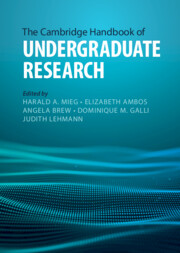Book contents
- The Cambridge Handbook of Undergraduate Research
- The Cambridge Handbook of Undergraduate Research
- Copyright page
- Contents
- Figures
- Tables
- Contributors
- Foreword
- Foreword
- 1 Introduction
- Part I Theory and Research on Undergraduate Research
- Part II Implementation, Approaches, Methods
- Part III Disciplines
- 17 Introduction
- Part III.1 STEM
- Part III.2 Health
- Part III.3 Social Sciences
- Part III.4 Humanities
- Part III.5 Arts & Design
- Part III.6 Disciplines A–Z
- 40 Undergraduate Research in Business Schools
- 41 Undergraduate Research in Early Childhood Education
- 42 Undergraduate Research in Geography
- 43 Undergraduate Research in Legal Studies
- 44 Undergraduate Research in Social Work Education
- 45 Approaches to Undergraduate Research in Sustainability
- 46 Undergraduate Research in Teacher Education
- Part IV International Perspective
- Part V Avenues for Developing Undergraduate Research
- Index
- References
41 - Undergraduate Research in Early Childhood Education
from Part III.6 - Disciplines A–Z
Published online by Cambridge University Press: 11 August 2022
- The Cambridge Handbook of Undergraduate Research
- The Cambridge Handbook of Undergraduate Research
- Copyright page
- Contents
- Figures
- Tables
- Contributors
- Foreword
- Foreword
- 1 Introduction
- Part I Theory and Research on Undergraduate Research
- Part II Implementation, Approaches, Methods
- Part III Disciplines
- 17 Introduction
- Part III.1 STEM
- Part III.2 Health
- Part III.3 Social Sciences
- Part III.4 Humanities
- Part III.5 Arts & Design
- Part III.6 Disciplines A–Z
- 40 Undergraduate Research in Business Schools
- 41 Undergraduate Research in Early Childhood Education
- 42 Undergraduate Research in Geography
- 43 Undergraduate Research in Legal Studies
- 44 Undergraduate Research in Social Work Education
- 45 Approaches to Undergraduate Research in Sustainability
- 46 Undergraduate Research in Teacher Education
- Part IV International Perspective
- Part V Avenues for Developing Undergraduate Research
- Index
- References
Summary
Early childhood education has become a prominent field focused on promoting the physical, social-emotional, and intellectual development in young children. Around the world, teacher educators seek ways for candidates to hone key pedagogical practices such as planning, assessment, and reflection inherent in inquiry-based instruction. Undergraduate research embedded in the training of future early childhood educators offers knowledge and skills in solving daily professional problems. Using action research, teacher candidates consult with community leaders, families of young children, and colleagues to implement evidence-based practices toward a common goal. The author shares examples and areas for undergraduate research in early childhood education.
Keywords
- Type
- Chapter
- Information
- The Cambridge Handbook of Undergraduate Research , pp. 390 - 397Publisher: Cambridge University PressPrint publication year: 2022

